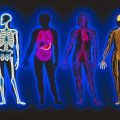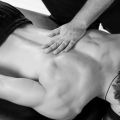How Poor Posture Affects the Body

Correct posture is not only an indicator of self-confidence but also the key to healthy and complete functioning of the body. But in the modern world, where we spend much of our time in front of the computer, on the phone, or in static positions, poor posture has become a real problem. It may be a consequence of the habit of bending over, weakness of the muscular corset, or even psychological factors. Let's find out exactly how bad posture affects the body and why it's important to be aware of it.
1. Effect on the spine and joints
The spine is the foundation of our body. Its curvature, caused by poor posture, can lead to back pain and various conditions. For example:
- Scoliosis. The curvature of the spine in the lateral plane often develops due to constant lowering or incorrect position of the body.
- Degenerative disc disease. Uneven stress on the intervertebral discs accelerates wear and tear, causing pain and limiting mobility.
- Hyperkyphosis. Excessive curvature of the thoracic spine (curvature) can lead to chronic pain and chest deformity.
In addition, poor posture puts additional pressure on the joints, especially the shoulders, hips, and knees, increasing the risk of developing arthritis and other diseases.
2. Muscle dysfunction
When the posture is incorrect, the muscles are forced to work under unnatural conditions. This leads to:
- Muscle imbalance. Some muscles become overworked and overworked, while others become weaker.
- Painful sensations. The most commonly affected muscles are the neck, shoulders, and lower back.
- Reduced resistance. Muscles tire more quickly because they work under constant tension.
3. Circulation problems
Poor posture affects the blood vessels. For example, constantly sitting with a bent back and crossed legs reduces blood circulation in the lower extremities, which can lead to swelling and varicose veins. Compression of blood vessels in the neck or chest can impair blood flow to the brain, causing headaches, dizziness, and impaired concentration.
4. Effect on the respiratory system
Poor posture, especially slouched posture, puts pressure on your chest and lungs. This limits breathing volume, reduces blood oxygen saturation, and can cause chronic fatigue. People with poor posture often experience shallow breathing, which impairs the functioning of the cardiovascular system and the brain.
5. Effect on the nervous system
Poor posture can put pressure on the nerve endings that run along the spine. This can lead to:
- Numbness and tingling in the limbs
- Reduced sensitivity and reflexes
- Chronic pain that negatively affects the quality of life
6. Conditions of internal organs
A curved spine and a compressed chest and abdomen interfere with the functioning of internal organs. As a result, you may experience:
- Digestive problems. For example, heartburn or slow bowel motility.
- Cardiovascular diseases. Incorrect body position can increase stress on the heart.
- Decreased function of the bladder and genitals. This is especially true for people who spend a lot of time sitting.
7. Psychological aspects
Poor posture is associated with physical health and emotional well-being. Slouching and sagging shoulders are associated with low self-esteem, depression, and anxiety. In contrast, an upright posture promotes self-confidence and a positive mindset.
8. Increased risk of injuries
Poor posture makes the body less stable and mobile, increasing the risk of falls and injuries, especially in older people. Furthermore, incorrect load distribution can cause sprains and ligament damage even with minimal physical exertion.
The bottom line
Poor posture is not only an aesthetic problem but also a serious factor that affects the health of the entire organism. If neglected, it can cause many physical and psychological disorders. However, timely prevention, awareness, and care of your body will help you avoid these problems and maintain health for many years.
Other articles and publications:
Articles and publications of other companies:
- +1 (646) 270-9836
- Long Island City
- grantny.com













